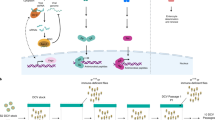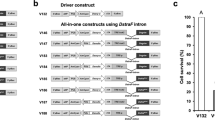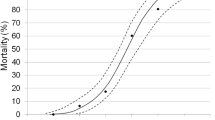Abstract
Drosophila melanogaster is subject to infection by the sigma virus, either by virus carried in the fly gametes or by extracts from infected flies. Infected flies somehow become ‘CO2-sensitive’ and thereafter are fatally poisoned if subjected to a dose of CO2, which is merely anaesthetic to virus-free flies. Plus1 showed that the time lag (incubation period) between a sigma injection and the onset of CO2-sensitivity is a measure of the injected dose, and sigma extracts are now usually titred by using them as inocula and measuring the resultant incubation period in recipient adult flies.
This is a preview of subscription content, access via your institution
Access options
Subscribe to this journal
Receive 51 print issues and online access
$199.00 per year
only $3.90 per issue
Buy this article
- Purchase on Springer Link
- Instant access to full article PDF
Prices may be subject to local taxes which are calculated during checkout
Similar content being viewed by others
References
Plus, N., Bull. Biol., 88, 248 (1954).
Brun, G., Doctoral dissertation, Paris (1963).
Wu, J. H., and Wildman, G., Nature, 199, 1015 (1963).
Burnet, F., Principles of Animal Virology (Academic Press, New York, 1960).
Seecof, R. L., Cold Spring Harb. Symp. Quant. Biol., 27, 501 (1962).
Author information
Authors and Affiliations
Rights and permissions
About this article
Cite this article
SEECOF, R. Resistance to Sigma Virus Infection in Drosophila. Nature 207, 887–888 (1965). https://doi.org/10.1038/207887b0
Issue Date:
DOI: https://doi.org/10.1038/207887b0
Comments
By submitting a comment you agree to abide by our Terms and Community Guidelines. If you find something abusive or that does not comply with our terms or guidelines please flag it as inappropriate.



